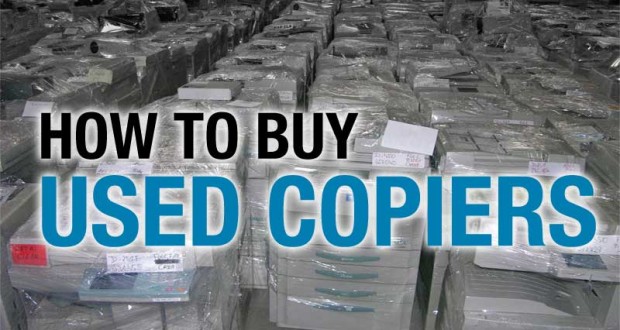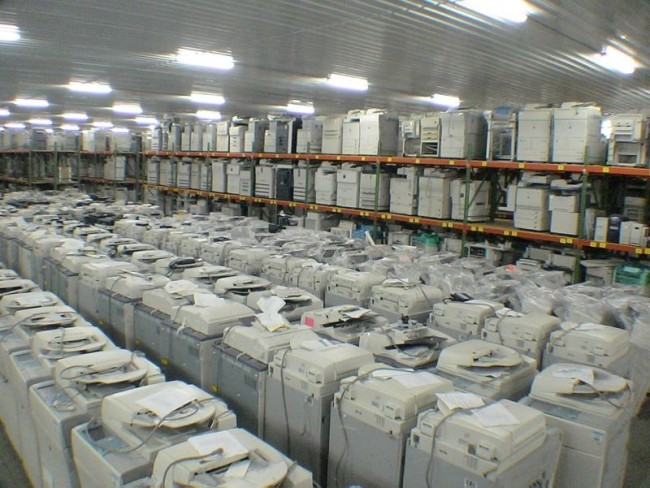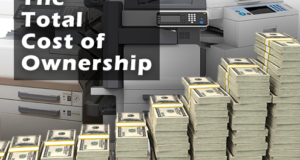Resell, recycle, reuse and refurbish are the four most popular ‘Rs’ in today’s business world especially due to environmental issues and cost effectiveness. It is no wonder that used copier machines for sale have grown in popularity both online an in your local listing (I can’t pull up the “business” classifieds in Craig’s List anymore without seeing at least three dozen active posts). While you need to be careful about purchasing used equipment, the truth is you can save big by opting for refurbished or used copier machines. You’ll not only be guaranteed lower prices, but you’ll also score a unit that isn’t saddled with a lease payment. For some business trying to keep down monthly costs, this may be an important factor.
Now for the warnings: Used copy machines for sale can be a landmine (economically) if you don’t take special care and pay attention to what you are buying. There is a way to go about purchasing used copy machines and used printers—and if you follow the basic guidelines you should avoid the common pitfalls (You know, like buying a machine that’s still under lease somewhere!)
Buying Used Copiers
Just because there are used copiers for sale in your area doesn’t mean they are a great deal. Use the following as a guideline when buying a used copier machine for your office (or for your home business for that matter). Just like a used car, the only difference between this copier and a new one might be a few scratches and some wear on longer-term components. For the most part, copy machines and printers have a nice shelf life if they are taken care of and maintained.
Check the Performance
This isn’t rocket science—testing your potential purchase prior to deciding on a purchase is imperative unless you like surprises. Since these machines have been on the market, print and speed performance is already known and you should be able to test both black and white and (if applicable) color performance as well as duplexing features. I’ve found that copying 25-30 pages from an ADF (automatic document feeder) is a great way to test a printer. You can also triple check that the network card works (a common problem when static electricity from a lightning storm blows out the card) and also if the menu system is functioning as expected. This is a lot easier if you’re buying a used machine from a local dealer or store, but even personal copier sales can allow you some basic testing—or you may want to let the deal go. If you don’t test a used machine you’re taking a major gamble and will likely end up spending more than you intended just to get an older machine in full operating order.
Consider the Age of the Machine
It shouldn’t be a big mystery how old a used copy machine is. Most are stamped with the date of manufacture in the same location as the serial number (and if you can’t find that then you may indeed not want to make the purchase as the product could be stolen). Aside from that, before buying any used copiers, it’s good to determine how long the product has been in use. The more a copier machine has been used, the more depreciation should lower the price—especially if the worn-out parts have not been replaced. Check that the essential parts of the printer or copier have been replaced or serviced as needed (or factor that into your price). Items you should check before buying include the cleaning blades, drums and the toner. In case these parts require replacement, make sure to get a price that will allow you to do the replacement without incurring more money on your purchase than is reasonable for the price. You can also check online to gauge the approximate age of used copiers or printers using their model numbers.
Consider the Kind of Ink or Toner Used in the Copier
While I wouldn’t buy a used copier or printer expecting a full array of toner, you do want to understand what you’re in for after the purchase. When examining used copiers for sale you want to know if they’ve been using aftermarket toner that may have gummed up the mechanism more than OEM toner. It is also possible that you may be buying a copier whose toner or ink is no longer easily available in the market. Because of demand, this will lead to a higher cost of operation over time.
A Final Note: Used Printer and Used Copier Warranties
Used copy machines for sale aren’t going to have any remaining warranty from the manufacturer. For the most part, these warranties expire after just one year (on the equipment). Consumables and maintenance items are even less—typically 90 days. Should you be given the option to purchase an extended warranty on a used machine, our recommendation is to not take it if it is over 30 days or not included in the purchase price (some companies will give you 30 days or a certain number of copies to guarantee the functionality of the machine). You will do much better engaging a service contract from a reputable service provider or dealer. These copier service contracts also tend to cover your consumables and are often a great way to end up with a care-free experience using a copier or office printer.
 CopierGuide Copier and Multifunction Printer Leases and Reviews
CopierGuide Copier and Multifunction Printer Leases and Reviews






